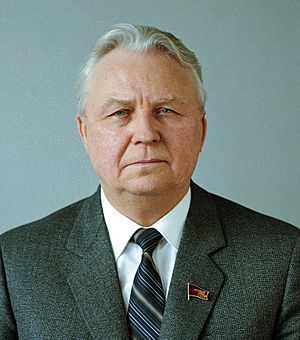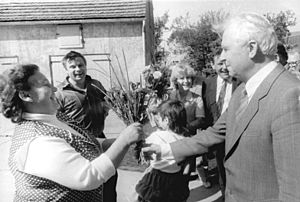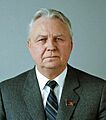Yegor Ligachyov facts for kids
Quick facts for kids
Yegor Ligachyov
Егор Лигачёв |
|||||||||||||||||
|---|---|---|---|---|---|---|---|---|---|---|---|---|---|---|---|---|---|
 |
|||||||||||||||||
| Second Secretary of the Communist Party of the Soviet Union | |||||||||||||||||
| In office 10 March 1985 – 14 July 1990 |
|||||||||||||||||
| Preceded by | Mikhail Gorbachev | ||||||||||||||||
| Succeeded by | Vladimir Ivashko (as Deputy General Secretary) | ||||||||||||||||
| Head of the Organizational-Party Work Department of the Central Committee | |||||||||||||||||
| In office 29 April 1983 – 23 April 1985 |
|||||||||||||||||
| Preceded by | Ivan Kapitonov | ||||||||||||||||
| Succeeded by | Georgy Razumovsky | ||||||||||||||||
| First Secretary of the Tomsk Regional Committee | |||||||||||||||||
| In office 26 November 1965 – 29 April 1983 |
|||||||||||||||||
| Preceded by | Ivan Tikhonovich Marchenko | ||||||||||||||||
| Succeeded by | Alexander Melnikov | ||||||||||||||||
|
|||||||||||||||||
| Personal details | |||||||||||||||||
| Born | 29 November 1920 Dubinkino, Kainsky district, Tomsk Governorate, Russian SFSR |
||||||||||||||||
| Died | 7 May 2021 (aged 100) Moscow, Russia |
||||||||||||||||
| Resting place | Troyekurovskoye Cemetery, Moscow | ||||||||||||||||
| Political party | Communist Party of the Soviet Union (1944–1991) Communist Party of the Russian Federation (1993–2021) |
||||||||||||||||
| Children | 1 | ||||||||||||||||
Yegor Kuzmich Ligachyov (born November 29, 1920 – died May 7, 2021) was an important politician in the Soviet Union and later in Russia. He was a high-ranking official in the Communist Party of the Soviet Union (CPSU). At first, he was a supporter of Mikhail Gorbachev, but over time, he became a strong critic of Gorbachev's leadership.
Contents
Early Life and Education
Yegor Ligachyov was born on November 29, 1920, in a small village called Dubinkino. This village was in the Tomsk region, which is now part of the Novosibirsk Oblast in Russia.
From 1938 to 1943, he studied at the Moscow Aviation Institute. He earned a degree in technical engineering. In 1944, when he was 24 years old, Ligachyov joined the Communist Party of the Soviet Union. He later continued his studies at the Higher Party School in 1951.
Family Life
Yegor Ligachyov had one son.
Political Career and Influence
Ligachyov's political journey started in his home region of Siberia. He eventually rose to some of the highest positions in the Communist Party. Many people saw him as Gorbachev's second-in-command. He held important jobs, like the Secretary for Ideology.
However, in 1990, Ligachyov lost his main positions. This was just a year before the Soviet Union broke apart. He then retired from his political career at the 28th Party Congress. Ligachyov often spoke out against both Boris Yeltsin and, to some extent, Gorbachev. He is often remembered as Gorbachev's main critic.
Serving in the Soviet Union

Before joining the Central Committee, Ligachyov held several important roles in the Novosibirsk region. He was the First Secretary of the Komsomol (a youth organization) and later a leader in the local government.
In 1961, Ligachyov got his first major job in the Central Committee of the Communist Party of the Soviet Union. This was a very powerful group that guided the entire Soviet Union. In 1965, he became the First Secretary of the Party in Tomsk, Siberia. He held this position for many years, until 1983.
In 1983, Yuri Andropov, a top leader, noticed Ligachyov. He then made Ligachyov head of the Party Organization Department and a Secretary of the Central Committee.
Ligachyov became a full member of the Central Committee in 1976. When Mikhail Gorbachev became the leader of the Soviet Union in 1985, Ligachyov was promoted to an even higher Secretary position. Many saw him as one of Gorbachev's main supporters at first. He had even tried to help Gorbachev become the leader earlier in 1984. Ligachyov was put in charge of the Secretariat, which managed the Party's daily work.
Ligachyov initially supported changes in the Soviet Union and Gorbachev's ideas. However, as Gorbachev's policies of perestroika (restructuring the economy) and glasnost (openness) started to look more like Western ideas, Ligachyov began to disagree. By 1988, he was seen as the leader of the more traditional group of Soviet politicians who opposed some of Gorbachev's changes. During this time, Ligachyov became known for saying, "Boris, you are wrong" when speaking about Yeltsin.
Ligachyov was a member of the Politburo (the main policy-making committee) from 1985 to 1990. On September 30, 1988, he was moved from his important role as Secretary for Ideology to Secretary for Agriculture. This was seen as a demotion.
At the 28th Party Congress in 1990, Ligachyov criticized Gorbachev. He felt that Gorbachev was taking too much power away from the Party. He also argued that Glasnost had gone too far. During this meeting, Ligachyov even ran against Gorbachev for the top leadership position, presenting himself as a traditional Communist. After losing, Ligachyov left the Politburo and retired for a short time.
After the Soviet Union
After the Soviet Union ended in 1991, Ligachyov continued his political career in the new Russian Federation. He was elected three times to the Russian State Duma (the parliament) as a member of the Communist Party of the Russian Federation. He was also a member of its Central Committee starting in 1993. However, he lost his seat in the Duma in 2003.
Ligachyov's book of memories, Inside Gorbachev's Kremlin, was published in 1996.
His Role and Views
Ligachyov became one of Gorbachev's main critics. He was often accused of leading a group of traditional politicians. While he said he supported perestroika (economic changes), Ligachyov did not agree with Gorbachev's efforts to expand the power of the Soviet government and reduce the responsibilities of Party officials.
Ligachyov did not support the decision to end the Communist Party's control over politics in 1990. He also disagreed with Gorbachev's response to the Soviet Union losing its power in Eastern Europe. He saw the quick reuniting of Germany as a "coming danger."
However, in 1988, Ligachyov denied that he was leading a traditional group. He said that the Party leaders were united behind Gorbachev. Even after the Soviet Union fell, he continued to deny in his book and speeches that he had opposed Gorbachev. Ligachyov clearly held traditional views, especially in his opposition to Yeltsin's ideas and some parts of glasnost. He later said he realized "only too late" that Gorbachev was becoming more like a social democrat.
Ligachyov's strong economic views were clear in his speeches to the Party Congress in 1990. In one speech, he also said he was a realist, not a traditionalist. He also stated that "the weakening of state rules" was a reason for economic problems. He and KGB chief Viktor Chebrikov often warned against too-rapid changes before he was moved to the agriculture role in 1988.
Although not much is written about it in his book, Ligachyov played a big part in the dismissal of Yeltsin. He argued with Yeltsin for a long time in 1987. Ligachyov disagreed with Yeltsin's idea that Party officials had too many special benefits.
For most of his time in the Politburo, Ligachyov was considered the "Second Secretary" of the Central Committee. This meant he was a very powerful figure in the Soviet Union.
Death
Yegor Ligachyov passed away on May 7, 2021, at the age of 100.
Images for kids
See also
 In Spanish: Yegor Ligachov para niños
In Spanish: Yegor Ligachov para niños


